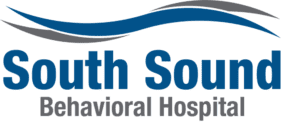South Sound Behavioral Hospital offers FREE Assessments 24/7, call us toll-free at
Adult Dual Diagnosis Unit
At South Sound Behavioral Hospital
South Sound Behavioral Hospital’s Dual Diagnosis Unit is an adult, inpatient diagnostic and treatment program designed to address the needs of individuals confronted with an addiction to alcohol or drugs, accompanied by an emotional or psychiatric illness.
Our in-depth, comprehensive evaluation process conducted by specially trained staff assesses the potential presence of substance abuse disorders and mental health disorders and obtains extensive details of each, as well as gaining a view of the general picture of your experiences.
An individualized treatment plan is then developed by you and your treatment team to fit your needs. Treatment strategies focus on assisting individuals to effectively develop a lifestyle free of alcohol or drugs, learn ways to manage the symptoms of emotional or psychiatric illness in a healthy, constructive manner, and develop relapse prevention strategies for both conditions.
Dual diagnosis symptoms vary depending on the addiction and mental illness involved.
Warning signs that you may need help from a dual diagnosis treatment program include:
- Needing alcohol or drugs to feel normal
- Difficulty keeping a job, maintaining relationships and making or meeting social obligations
- Isolation
- Erratic behavior Irritability, agitation or anger, especially when you stop using substances
- Depression or anxiety when you stop using substances
- Extreme emotional highs and lows
- Financial and/or legal problems, especially if tied to substance abuse
- Poor self-care (e.g. neglecting physical health, nutritional needs or hygiene)
This specialized program provides the opportunity for the individual to sustain recovery, develop healthy coping skills and address the mental health problems equally.
We help individuals by utilizing a multidisciplinary treatment approach, including; psychiatrists, licensed therapists, registered nurses, as well as substance abuse, and mental health professionals, all with the goal of addressing each person’s unique treatment needs.
